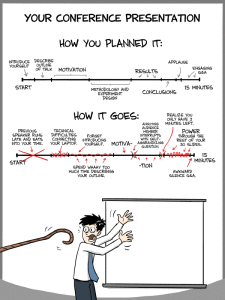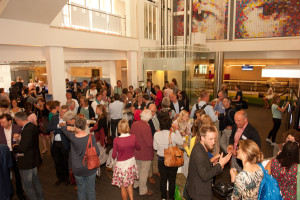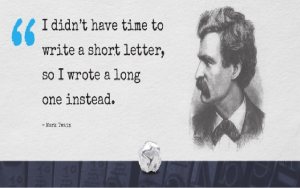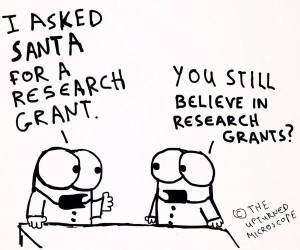Last week Tessa and I gave you an overview of our experiences from a conference (the ORD2015) we recently attended. We really hope you had fun reading our experiences and maybe related to it from your own experiences. This time I would like to be more helpful with my blogpost by providing tips when attending conferences. Or, actually I should say that I am only helpful by showing these tips to you… Other people have provided them; I asked PhD students from ICLON and other institutes to provide tips for when you are attending a conference. The idea is that everyone (presenter, non-presenter, already having a large network, in a presentation not completely on your subject, etc.) attending a conference should find some useful tips in here.
Before the conference
Jorine Vermeulen (PhD student at CITO and University of Twente) told me to be sure to prepare before attending the conference: Take at least half a day in advance to check out the program and make a selection of must go to session as well as sessions you can possibly skip for an extra break, some working, or a meet up with some people you really want or need to talk to about your project.
Daniël van Amersfoort (PhD student at Welten Institute, Open University) gave a tip you should think about when signing up for the conference: Always visit pre- and post-conferences or, in case it is being organized, a doctoral consortium; most of the times these meetings are more profound than the conference itself. In addition, these are perfect places to meet people you will probably also see at the conference!
In addition he says you should not only try to schedule where you are to meet new people, but: If it is a bigger conference and there are specific people, or even ‘big names’ you want to meet, email them months before the conference. Using this approach, I have sat at a table with almost half my bookcase ;-)!

Preparing a presentation for the conference? Bas Agricola (part-time PhD student at Utrecht University) has some tips for you:
- Use the more standard building blocks for your presentation (theoretical framework and research question, method, results, and conclusion and discussion). This way it will be recognizable for you audience.
- Considering your PowerPoint, Prezi, or other way of presenting you use; do not use too many words on your slides. Try to prevent from writing full paragraphs, use key words.
During the conference
The time has finally come. It is time for the conference! Time to do something with your preparations. But also, to be spontaneous; you didn’t plan that extra break for meeting specific other people? No problem, according to Nienke Woldman (PhD Student at Wageningen University and president of VPO): Do n ot only attend presentation sessions. Make sure to have spare time to talk to other researchers. Making new contacts and maintaining ‘old’ ones is at least as important at a conference as exchanging information during sessions. Most of the times the scheduled breaks are too short for this. So, be spontaneous, decide suddenly to skip a session, grab a cup of coffee and see who you end up talking to. Sometimes at these, more quiet moments, you make really good contacts!
ot only attend presentation sessions. Make sure to have spare time to talk to other researchers. Making new contacts and maintaining ‘old’ ones is at least as important at a conference as exchanging information during sessions. Most of the times the scheduled breaks are too short for this. So, be spontaneous, decide suddenly to skip a session, grab a cup of coffee and see who you end up talking to. Sometimes at these, more quiet moments, you make really good contacts!
Daniël also made this point when I asked him for tips. Although he added: Do not stick with your colleagues the whole conference. You see these people often enough; go your own way. (also hearing Fleetwood Mac in you head right now?! I am….)
By the way, if you haven’t contacted those ‘big names’ do not think you’ve missed your chance. You have something to discuss with them? Do not hesitate to approach then and ask if you could discuss your research with them over breakfast or lunch.
Of course, during conferences the prepared presentations mentioned above are being presented. Are you presenting yourself? Bas has a tip for you: Share your doubts with the audience. Being transparent on the subjects you still have questions about will provide the best input for discussion and questions. And this in turn, will provide you with new information and thoughts to take home.
The idea during presentation sessions is that the audience is not a passive listener of what the presenter as to tell. Bas says: Actually, the same I just said about the presenter counts for the audience; share your thoughts. You do not have to be fully informed on the research subject of the presentation. You can always provide some new viewpoints on methodology and share your questions, criticism and feedback. Sometimes these new viewpoints are very refreshing for a researcher who is most of the time surrounded by his own research (subject).
How you can do this and what you can get from being an active listener, Tim (PhD student at ICLON, also blogger here on the research blog) shares with you.
Having attended several conferences as a non-presenter I would like to share some tips about ‘that what is not being said’. These can range from implicit assumptions, logical fallacies in reasoning, leaps of faith or simply not stating the obvious. To better understand the presenter and whatever it is (s)he is presenting about it can be very useful to make the implicit, explicit. For example:
- Make notes (mentally or physically) during a presentation on which implicit assumptions the speaker makes about any theoretical models being used. To what extent does the presented study rely on the mentioned model or theory? Is it being assumed that this is the only theory? A complete theory? Is it being contrasted with alternative theories?
- For studies which use a sample to generalize to a population: what exactly is the sample a sample of? What are the limits of generalizing the findings of the study? How representative (in size and characteristics) is the sample of the specific population?
- For studies which use inference statistics: to what extent are the analyses explorative (e.g. no a-priori established hypotheses were made and many analyses were performed) or confirmatory (e.g. a-priori established hypotheses were tested)? What does this tell you?
- For the ‘conclusions’ part of a presentation: are the conclusions sufficiently backed up by what was said before or are there hidden reasoning steps? If the given conclusions would not be true, would the presented study be able to found evidence for this? What are the alternative explanations or conclusions which may also have some – or maybe more – merit?
The goal is not to be overly skeptical, but to be sufficiently critical to look beyond what is being presented and (hopefully) learn more. This does not only help you to better understand presentations at a conference but might also prove helpful for your own studies, articles and presentations. But that’s just my assumption.
Now Jorine, Daniël, Bas, Nienke and Tim have flooded you with tips, I wish you a very fruitful conference the next time you attend one!

Oh, wait before I say goodbye here is a last tip from Nienke:
Never skip a ‘borrel’! Enjoying a drink together can be the beginning of the best collaborations!
Do you have tips that haven’t been shared? Let us know!



 a. Delete articles, adverbs, adjectives, connectives, propositions, and auxiliary verbs
a. Delete articles, adverbs, adjectives, connectives, propositions, and auxiliary verbs



Recent Comments